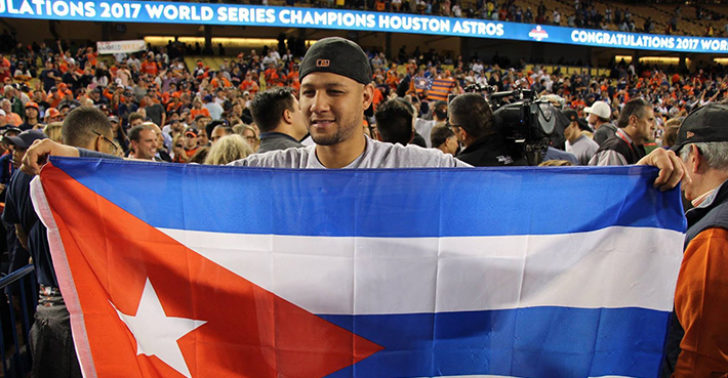
Gurriel and the Cuban flag
HAVANA — At the end of the last game of the so-called World Series of baseball in the United States, an unexpected act occurred: Astros’ player Yulieski Gurriel celebrated his team’s victory by draping a Cuban flag around his shoulders.
As a friend told me, that sight drew applause among fans gathered somewhere in Havana to watch the game live on closed circuit. A similar emotion was felt one day later, when millions of Cubans watched the game at home on national TV.
The fans had felt themselves reflected in the victory of something so foreign as a Texas team, and they did so thanks to the gesture of a youngster who, to them, continued to be “el Yuli.”
After a brilliant career, Yulieski Gurriel left Cuba with his younger brother, another fine prospect in Cuban baseball, on Feb. 8, 2016, after the end of the Caribbean Series in the Dominican Republic.
Despite the sensationalism that surrounded the defection — an escape from the hotel in Dominican military cars, a secret trip to Haiti and resurgence in Miami — it was a fairly routine story for most of the 23 Cubans who play in Major League Baseball today.
Cuba can do little to stanch this constant hemorrhage of its best players, because it competes at a disadvantage with the prestige, fame and huge salaries offered by U.S. baseball, especially at a time when the commercialization of sports has overtaken the national and ethical barriers that used to limit defections.
The theft of talent we witness is much worse than what we see anywhere else in the world, inasmuch as Cuba has invested much money and effort in the overall development of those athletes, but the phenomenon is not very different than what’s happening with many young Cubans.
The basic cause is the same: Cuba produces a talent (in this case, sports stars) that the country cannot afford to reward fully, and the market takes advantage of the situation.
Add to this the fact that emigrating does not have the political connotation it used to have. It is hard to convince these young people that playing ball in any other country is an anti-patriotic act, even if the defection package almost always includes some political statement or other and the players are forced to sign contracts that forbid them to play in Cuba or benefit their homeland with their earnings.
No longer do the Cuban people perceive these migrants negatively, so the triumph of their ball players anywhere continues to be a source of national pride. Therein lies the impact of Gurriel’s gesture with the flag. It is a demonstration that the love of Cuba is overwhelmingly present among the thousands of Cubans who live all over the world today.
It should be seen as a strength of the nation that allows the development of a more inclusive policy regarding emigration and its linkage to Cuban society. It should become a normal phenomenon — call it “migratory circularity” — and will require important modifications of the existing regulations.
Short term, that sentiment attenuates the most negative effects of the departure of young people who can contribute so much to the nation’s development. In terms of baseball, read what Gurriel himself told Playoff Magazine last January:
“The truth is that nostalgia is always with you. You never forget all those great moments you lived in Cuban baseball. I don’t lose hope that someday I shall return to the country of my birth — the country to which I owe everything I am — to once again wear with pride the jersey with four letters.”
Against that way of thinking (common among most Cubans who live abroad) no U.S. policy can succeed. But you have to understand it fully.
Progreso Weekly authorizes the total or partial reproduction of the articles by our journalists, so long as the original source and author are identified.

